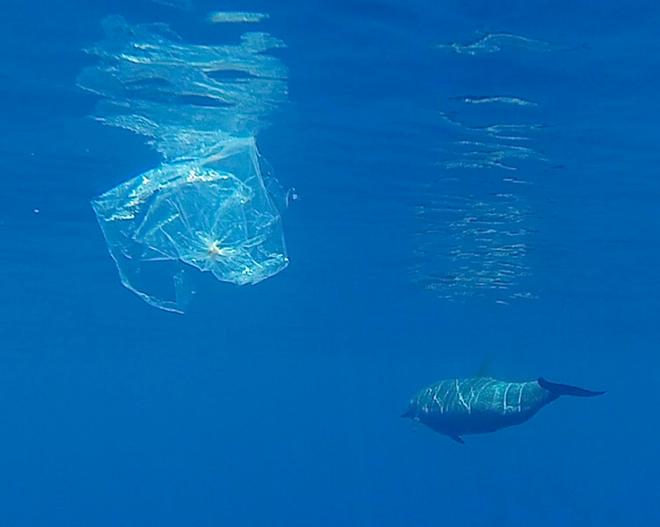Eliminating plastic bags from the world’s oceans—World Cruising news
by David Schmidt, Sail-World Cruising Editor on 15 Sep 2015

Plastic, plastic everywhere... ImDagina
Given the constant drumbeat of bad news coming from climate-change specialists, ecologists, marine biologists and other smart people with far more impressive degrees than my own, it’s easy to feel bogged-down by bad news.
But, as with any large and complex problem, it’s essential to break the situation down into many small, manageable bites and delegate tasks appropriately. And while the task of forging unified national efforts has traditionally been the province of federal-level governments, some seemingly small changes on a personal level can yield solid, real-time change.
If you have been reading this newsletter for a while, you’re familiar with the proud efforts of Boyan Slat, the 21-year-old Dutch inventor and entrepreneur who studies aerospace engineering and dedicates significant amounts of his free time to solving the problem of removing plastic debris from the ocean. And while Slat’s foundation, the Ocean Clean Up, is dedicated to using simple technologies to tackle a complex cleanup job, an equally simple question remains: What if the plastic wasn’t in the water to begin with?
While there’s no question that plastic has made a huge and positive impact on some aspects of our society, there’s also no question that plastic can cause significant environmental problems as it breaks down, especially if it reaches our oceans. According to various experts, plastic debris has a tendency to break down into many small bits once exposed to salt water and sunlight. Seabirds and other marine wildlife oftentimes unwittingly consume these plastic bits, which clog their digestive tracks and ultimately sentence the animals to painful, needless deaths.
So how can individuals help make a difference? As with many Tragedies of the Commons, the oceans are getting increasingly polluted with plastic debris due to myriad individual decisions, ranging from the products (and packaging) that we buy, to the bags that we use to carry our goods home with, to the ways in which we dispose of our refuse, ex post facto. And while molded plastic parts are now a part of many finished products, these are typically durable items that last for years, if not decades, thus casting a greater emphasis on reducing the use of one-time, disposable-use items such as plastic shopping bags.
If you read any accounts of offshore sailing these days, it’s dead common to hear of raceboats wrapping plastic bags around their foils, or of cruising sailors witnessing large amounts of plastic bags floating near the water’s surface. Reversing this trend is a matter of choice, both for individuals and for governments both large and small.
Almost all serious cruising sailors carry a few reusable canvas shopping bags, which they dutifully throw into the dink when it’s time to head ashore for provisions. Just think of the global difference that could be realized if the world’s population embraced this everyday cruising practice. The difference in the amount of plastic debris floating on the ocean-and, vis-à-vis, harming wildlife-would be staggering, and while this wouldn’t solve the situation of carbon-dioxide levels, melting polar ice caps or vanishing polar bears, it would improve the health of marine wildlife, while also restoring grandeur to one of the earth’s most impressive ecosystems.
So can real change be realized through many individual actions? Yes, especially if individual actions lead to new best practices, and, ultimately, to new laws as has already happened in some countries.
My hometown of Seattle has long prided itself on its good environmental practices, from our recycling and yard-waste programs, to our miles of bike infrastructure, to our sustainable stormwater program. So it came as no surprise to many of us when, effective July 1, 2012, the city banned the use of disposable plastic shopping bags. The positive changes were immediately noticeable, both on land and on Puget Sound. This legislation could (and should) be exported to other parts of the world, especially as new technologies, including biodegradable vegetable-based plastics, continue to arrive.
And while Seattle and the Pacific Northwest are certainly a lot greener than other parts of my country (sorry, Texas, but it’s time to evolve), the bottom line is that citizens of every nation can easily start carrying their own reusable bags to the store, thus eliminating the demand for single-use non biodegradable plastic bags.
Or even better, concerned citizens can take this smart thinking one step further and demand that their governments ban the use of these non-biodegradable bags on local, national or-ideally-international levels. Given the reports coming from areas such as the North Pacific Gyre, it seems as if the excuses for not banning non-biodegradable plastic bags are running thin.
Granted this will take some work, but the benefits to all humans, both mariners and landlubbers, would be dramatic, and it would certainly take some weight off the shoulders of young Mr. Slat.
May the four winds blow you safely home,
If you want to link to this article then please use this URL: www.sail-world.com/138204